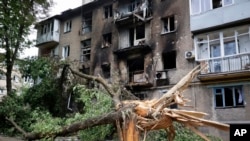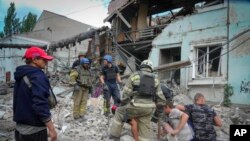Britain’s Defense Ministry said Wednesday that Russia is continuing its heavy shelling as it tries to envelop the Sievierodonetsk area.
A ministry statement also said Russia is “highly likely preparing to attempt to deploy a large number of reserve units to the Donbas.”
Ukrainian President Volodymyr Zelenskyy said in his nightly video address that the military situation in the eastern region of Luhansk “is really the toughest area right now. The occupiers are also putting serious pressure on the Donetsk direction.”
He said Russia has stepped up efforts to evict Ukrainian troops from key areas.
Serhiy Haidai, governor of Ukraine’s eastern Luhansk region, told The Associated Press in written comments, “It’s just hell there. Everything is engulfed in fire. The shelling doesn’t stop even for an hour.”
“Today, everything that can burn is on fire,” Haidai said. He reported heavy fighting at the Azot chemical plant in Sievierodonetsk, where Ukrainian fighters and about 500 civilians are taking shelter.
Russian forces control about 95% of the Luhansk region, AP reported, with Ukraine forces holding just the Azot chemical plant in Sievierodonetsk.
Haidai also said Russian forces had brought “catastrophic destruction” to Lysychansk, an industrial city just across a river from Sievierodonetsk.
Zelenskyy acknowledged difficulties trying to defend the country’s eastern region but said Russian forces would continue to be met with Ukrainian resistance.
In Lviv, Ukraine, U.S. Attorney General Merrick Garland met Tuesday with Prosecutor General Iryna Venediktova to announce the creation of a team focused on war crimes accountability, the Justice Department said.
“The United States is sending an unmistakable message. There is no place to hide. We will, we and our partners, will pursue every avenue available to make sure that those who are responsible for these atrocities are held accountable,” Garland told reporters.
The War Crimes Accountability Team will assist Ukraine with criminal prosecution, evidence collection and forensics of human rights abuse, war crimes and other atrocities, the department said, adding that the team’s lead counselor is Eli Rosenbaum, a Justice Department official who once led the effort to track down Nazi war criminals.
“America — and the world — has seen the many horrific images and read the heart-wrenching accounts of brutality and death that have resulted from Russia’s unjust invasion of Ukraine,” Garland said in a statement.
The team will also focus on potential war crimes over which the United States has jurisdiction, including killing and wounding U.S. journalists, the department said.
"In addition, the Justice Department will provide additional personnel to expand its work with Ukraine and other partners to counter Russian illicit finance and sanctions evasion. Among other things, the Department will provide Ukraine an expert Justice Department prosecutor to advise on fighting kleptocracy, corruption, and money laundering,” the DOJ statement said.
Also, Ukraine is set to become an official candidate for European Union membership on Thursday, ministers and diplomats said on Tuesday.
Last week, the European Commission recommended the action. After several days of internal EU discussion, none of the 27 member states have voiced opposition to the plan, three diplomats told Reuters.
“We are working towards the point where we tell [Russian President Vladimir] Putin that Ukraine belongs to Europe, that we will also defend the values that Ukraine defends,” Jean Asselborn, Luxembourg’s foreign affairs minister, said, according to Reuters.
Meanwhile, U.N. spokesman Stephane Dujarric said Tuesday that the United Nations and its humanitarian partners delivered on Monday “12 trucks of critical supplies to help nearly 64,000 people in the cities of Kramatorsk and Sloviansk.” He said the cities are close to the front lines of the government-controlled Donetska Oblast.
The humanitarian convoy that reached the two cities carried hygiene supplies, water purification tablets and food assistance, he said.
“This humanitarian convoy was possible thanks to the support of several U.N. agencies, as well as nongovernmental organizations,” Dujarric said. “The international community has now stepped up and generously provided nearly 70% funding to our humanitarian appeal for Ukraine, which stands at $2.25 billion.”
VOA U.N. correspondent Margaret Besheer contributed to this article. Some information came from The Associated Press, Reuters, and Agence France-Presse.








